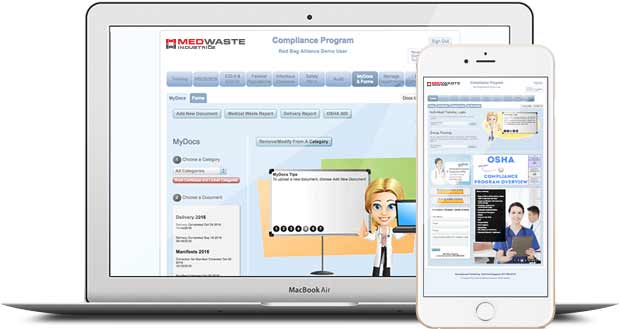Meet your new
medical waste
disposal company
We’re here when you need us, seven days a week. We’ll ensure that your facilities get the very best quality service from MedWaste Industries.
ABOUT OUR
MEDICAL WASTE DISPOSAL SERVICES
MedWaste Industries, a friendly medical waste disposal company located in Atlanta. We are a group of local business professionals who operate regionally but are always thinking globally. In Atlanta, no organization has a better reputation than us, and if you’ll let us, we’ll show you why.
“The Next Generation of
Solutions
&
Sustainability“
WE ARE THE
LEADING MEDICAL WASTE DISPOSAL SERVICE
- Medical Waste
We guide and help you through every step of the process, from understanding proper segregation of waste types, proper transportation of the waste, and proper treatment and disposal of the waste.
- Sharps Waste
Our trained technicians will professionally pickup, remove, and replace containers from your place of business without distraction. We will provide you with information regarding what goes into the sharps containers. Our service also has an option for us to bring the new containers to you, rather than you having to order them from a third party.
- Hazardous Waste
We help you implement a process that safely and efficiently directs your facilities waste to the appropriate transportation and treatment resources.
- Pharmaceutical Waste
We partner with you to create and implement a program that ensures proper categorization and appropriate treatment of your Pharmaceutical and expired medical waste.
- Waste Auditing & OSHA Training
We provide a variety of online solutions that provide tracking of collection and destruction. We also provide compliance services for training related to OSHA, Blood Borne Pathogens, ICD9 – ICD10 coding, HIPAA, and safety plan building, to mention a few, as part of our service.
- HIPAA Compliant Shredding
Our team is trained and HIPAA complaint to safely collect, transport and destroy your confidential documents and media.
WE HAVE THE
TECHNOLOGY SOLUTIONS YOU NEED
- Latest Technology
Our technicians from their desktop or mobile app can see your address, phone number, service subscribed to, frequency of pickup, special instructions, hours of operation, directions and complete a pickup with both parties signing and an automatic email of the manifest being sent once signature is completed.
- Customized Solutions
We can provide turnkey service that includes Waste Collection, Pharmaceutical Disposal, Sharps Container Replacement, Hazardous Medical Waste, and HIPAA Compliant shredding, all in one service agreement. You can choose which services you need, and you can have flexibly scheduled pickups: weekly, biweekly, monthly, quarterly, or semi-annually.
- Unlimited Options
Our goal is to make your life easier by reducing the number of vendors you have to deal with entering your office. We can structure a program that keeps you compliant, minimizes the effort on your part, and saves you money.
- Digital Compliance and Tracking
Our solutions are designed so that everyone has easy access to data. Should an audit occur, you can easily go online to print out the required information related to Medical Waste Collection or OSHA Compliance training. This is the same place you will assign your staff to complete and print certificates of training. You can also build and store your safety plan in the system.
WE PROVIDE
5 STAR SERVICE
Based in Atlanta and serving 159 counties in Georgia, MedWaste Industries is your integrated Medical Waste solution provider.
Our mission is to help people every day by providing our customers with the best 5-Star service in the industry and a cost effective solution to their medical waste that keeps them compliant. We help with ensuring employee and customer safety, and with keeping compliant with HIPAA and all state and federal laws in accordance with OSHA to create a safe and protected environment.
To stay in touch with our latest news, please fill out this form!
KEEP IN TOUCH
Sign up and stay up-to-date about what's happening at our site.
We will get back to you as soon as possible
Please try again later
What Our Clients Say

"MedWaste Industries staff is professional, friendly, and always on time providing me the 5-Star level of service promised and expected. They make the process easy for my office by combining services and reducing the effort on my staff. I have known and worked with the owners of MedWaste Industries for more than 20 years, I know that integrity, faith, and community service are key pillars they support each and every day. I would highly recommend MedWaste Industries to service your needs they will do a great job for yo
DR. JOEY LAMB DDS
ALPHARETTA, GA
DR. JOEY LAMB DDS - ALPHARETTA, GA
"I highly recommend MedWaste Industries for Biohazzard and shredding services. They are very easy to work with and even accommodated some additional needs of ours that were not included in their regular service structure. Their rates are very competitive and their customer service is exceptional. I feel very secure in their ability to keep all of the private data from our office safe as they are always up to speed on the local and federal regulations. We are completely satisfied with they service the provide!!!"
JENNIFER SEITZ
GEORGIA MEDICAL TREATMENT CENTERS & MEDICAL WEIGHT LOSS CLINICS
JENNIFER SEITZ - GEORGIA MEDICAL TREATMENT CENTERS & MEDICAL WEIGHT LOSS CLINICS
"The MedWaste Industries team approach was very professional, consultative, and flexible when it came to setting up our schedule and service agreement. MedWaste Industries combines services to make things easier for our office and more cost-effective. I called to cancel service with the large nationwide provided and they refused to make my last pickup. When I contacted my MedWaste Industries team they came out the same day and made the pickup that’s what I call customer service."
OCEAN HALULA
SYNERGY MEDICAL CENTERS
OCEAN HALULA SYNERGY MEDICAL CENTERS
MEDICAL WASTE DISPOSAL
FAQS
- Can you tell me more about MedWaste Industries?
MedWaste Industries, a friendly medical waste disposal company located in Atlanta. We are a group of local business professionals who operate regionally but are always thinking globally. In Atlanta, no organization has a better reputation than us, and if you’ll let us, we’ll show you why.
MedWaste Industries is your complete solution when getting rid of medical waste, biohazardous material, and HIPAA compliant shredding. We’ll pick up all hazardous waste, pharmaceutical waste, and documents that need destroying. We even supply onsite solutions including training staff, performing mock audits with corrections, checking for signage compliance, HIPAA, and first aid compliance, PPE assistance, and creating site-specific safety plans. As a medical facility making sure you are following all OSHA, HIPAA, and state and federal laws is principal to the success and safety of your business. We pride ourselves, through efficiency and five-star customer service, in keeping you informed, up to date, and within all regulations so your faculty and patients can thrive.
When you give us a call, you’ll be directly connected to our staff, so you can expect immediate attention to your inquiry. Call today!
- What is medical waste?
Medical waste is a subset of wastes generated at health care facilities, such as hospitals, physicians' offices, dental practices, blood banks, and veterinary hospitals/clinics, as well as medical research facilities and laboratories. Generally, medical waste is healthcare waste that that may be contaminated by blood, body fluids or other potentially infectious materials and is often referred to as regulated medical waste.
- How do you dispose of medical waste?
As is the case for all waste, the best practices for managing it start at the point of generation, when waste is produced. In order to collect waste, one must first be familiar with what to collect exactly, since there each category of medical waste needs to be separated from the other types. In practice, this means using the right containers. These are usually color coded to help biomedical waste segregation.
Improper management of discarded needles and other sharps can pose a health risk to the public and waste workers. For example, discarded needles may expose waste workers to potential needle stick injuries and potential infection when containers break open inside garbage trucks or needles are mistakenly sent to recycling facilities. Janitors and housekeepers also risk injury if loose sharps poke through plastic garbage bags. Used needles can transmit serious diseases, such as human immunodeficiency virus (HIV) and hepatitis.
Potential alternatives to incineration of medical waste include the following:
- Thermal treatment, such as microwave technologies;
- Steam sterilization, such as autoclaving;
- Electropyrolysis; and
- Chemical mechanical systems, among others.
With EPA's tighter HMIWI standards, the number of HMIWIs in the United States has declined since 1997. This has lead to an increase in the use of alternative technologies for treating medical waste. The alternative treatments are generally used to render the medical waste non-infectious then the waste can be disposed of as solid waste in landfills or incinerators. Many states have regulations requiring medical waste treatment technologies to be certified, licensed or regulated.
- What are common OSHA medical waste violation?
- Disposal of mercury-containing devices such as fluorescent bulbs and mercury thermometers in the trash
- Failure to identify all waste materials and determine if they are hazardous or non-hazardous waste, and dispose of accordingly
- Failure to label containers accumulating hazardous waste with the words “Hazardous Waste”
- Failure to maintain signed copies of hazardous waste manifests for three years Failure to train employees that manage hazardous waste at least annually to respond to hazardous waste emergencies
- Failure to conduct and document weekly inspections of all areas where hazardous waste is being accumulated
- Failure to post emergency contact information at phones near the hazardous waste accumulation areas
- Failure to pay annual hazardous waste fees (LQG and SQG only)
- Failure to document arrangements with the local fire department, police department
- Are there different types of medical waste?
Medical waste is broadly classified as any item that comes into contact with body fluids. Specifically, it is any solid waste that is generated in the diagnosis, treatment or immunization of humans. This type of waste was once collected in special bags and plastic boxes in clinical settings and then disposed of like normal trash. However, this process was quickly found to spread diseases and viruses and potentially cause outbreaks.
Today, the red biohazardous containers and bags seen throughout hospitals and doctors’ offices are used to safely remove sharps, needles, and IV catheters that contain any human blood or bodily fluid. Medical waste also includes paper towels, wipes, gloves, syringes without needles, bandages or dressings with small amounts of dry blood or fluid, and any other material from medical care. Syringes with needles or sharp objects that can pierce through a plastic bag require a special storage container for additional protection.
It is important to understand the distinction between anatomical and pathological waste. While both are wastes derived from the human body, pathological wastes are unique in that these are typically samples of tissues that are examined in a laboratory setting to understand the nature of the disease or affliction from which a patient suffers. For the most part, pathological waste refers to very small tissues sections and body material derived from biopsies or surgical procedures that are then examined in the lab. Anatomical wastes are typically distinguished as recognizable human organs, tissue and body parts, and may require special treatment under some state regulations.
INQUIRIES
For any inquiries, questions or commendations, please call: 800.988.5210 or visit our
Contact Page
EMPLOYMENT
To apply for a job with MedWaste Industries, please send a cover letter together with your resume to: david@medwasteindustries.com
Medical Waste
All Rights Reserved | MedWaste Industries

